Introduction to AI in Personal Finance
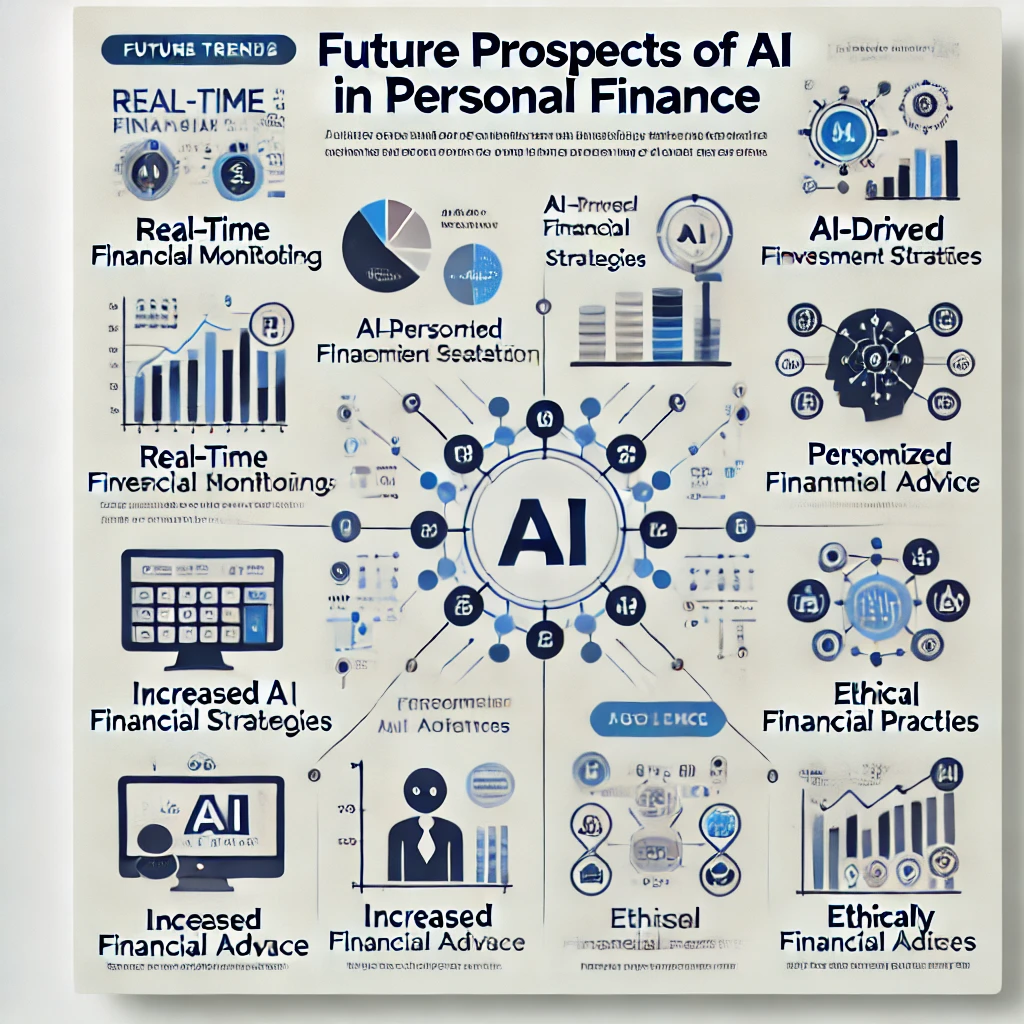 Image source: Redress Compliance
Image source: Redress Compliance
What is AI in Personal Finance?
Artificial Intelligence (AI) in personal finance refers to the utilization of advanced algorithms and machine learning technologies to analyze, predict, and enhance various financial processes and decision-making. This integration of AI into personal financial management allows users to optimize their budgeting, track expenses, invest wisely, and enhance their overall financial health.
AI systems leverage vast amounts of financial data—ranging from spending habits to investment trends—to deliver actionable insights. By doing so, they empower individuals to make informed decisions about their finances more efficiently than traditional methods. For instance, AI-powered applications can analyze a user’s financial behavior and provide real-time recommendations to improve savings or investment strategies.
The capabilities of AI in personal finance extend beyond mere number-crunching. These intelligent systems can also learn from user interactions over time, refining their suggestions to align with evolving financial goals and lifestyles. Some common applications include:
- Automated budgeting: Helping users to create and manage budgets based on their spending patterns.
- Expense tracking: Monitoring transactions to provide insights into spending habits.
- Investment management: Offering personalized advice through robo-advisors based on individual risk profiles.
By tapping into AI technologies, personal finance management becomes more accessible and user-friendly, catering to both novices and experienced investors alike.
For a deeper insight into the intersection of AI and financial services, you can refer to this Forbes article that discusses the evolving landscape of AI in finance.
In conclusion, AI is revolutionizing personal finance by providing tools that not only streamline financial management but also allow for more strategic decision-making. As technology continues to advance, the potential applications of AI in personal finance are limitless, promising a smarter financial future for all.
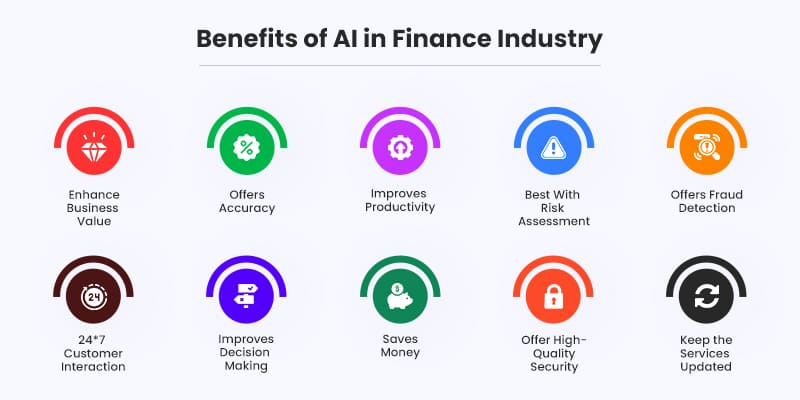 Image source: Finance Industry
Image source: Finance Industry
Benefits of AI in Managing Your Finances
Automated Budgeting and Expense Tracking
AI-powered tools can radically transform the way individuals manage their budgets and monitor expenses. By automating the process, these tools enable users to seamlessly track their spending habits in real-time. Platforms such as Mint and YNAB (You Need A Budget) leverage AI to categorize expenses, send alerts for unusual spending, and offer tailored budgeting suggestions. This personalized approach not only provides insights into spending patterns but also makes budget compliance easier by sending reminders and alerts when users are nearing their budget limits.
Moreover, automation reduces the manual effort involved in budgeting. Instead of sifting through receipts or logging every transaction, individuals can enjoy the convenience of AI tools doing this work efficiently. Such automation ensures that budget management becomes less of a chore and more of an integrated part of one’s financial routine.
Smart Financial Planning with AI Tools
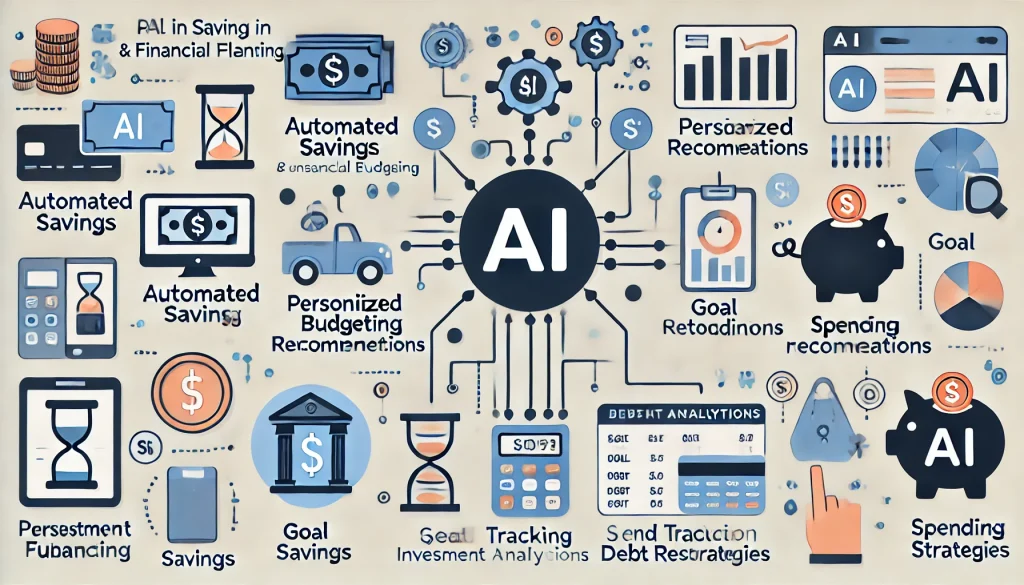 Image source: AI in Saving and Financial Planning
Image source: AI in Saving and Financial Planning
AI tools also facilitate intelligent financial planning, allowing users to anticipate future needs and make informed decisions. For instance, platforms like Personal Capital offer features that help users forecast their future financial trajectory based on savings rates, spending habits, and market trends. With the ability to analyze vast datasets, AI can identify trends and suggest realistic financial goals, tailored to an individual’s financial position and aspirations.
Additionally, the integration of machine learning can refine these recommendations over time, learning from users’ behaviors and adapting plans accordingly. This creates a dynamic financial roadmap that evolves alongside changing life circumstances, whether that be a new job, a major life event, or market fluctuations.
Improved Fraud Detection and Security
One of the paramount benefits of AI in finance is its enhanced fraud detection capabilities. Financial institutions are now deploying AI algorithms that monitor transactions at lightning speed. These systems not only identify patterns of legitimate behavior but can also flag anomalies indicating potential fraud.
According to IBM Security, AI-driven security solutions can detect fraudulent activities with remarkable accuracy, allowing banks and consumers to respond swiftly to suspicious transactions. By learning from historical data, AI systems can improve their fraud detection rates over time, adapting to new fraudulent schemes as they emerge. This advancement not only protects financial assets but also boosts consumer confidence in their banking systems and services.
Personalized Investment Advice from Robo-Advisors
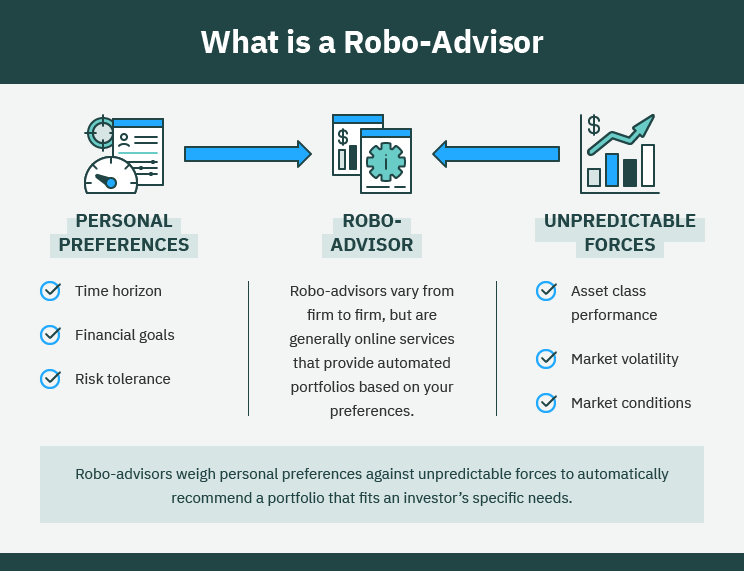 Image source: What is a Robo-Advisor
Image source: What is a Robo-Advisor
Lastly, robo-advisors offer personalized investment advice that is particularly valuable for individuals seeking to optimize their investment strategies without the hefty fees typically associated with financial advisement. These AI-driven platforms, such as Betterment and Wealthfront, assess individual risk tolerance, financial goals, and investment preferences to create tailored portfolios.
Robo-advisors automate the investment process through algorithms that actively manage and adjust portfolios based on real-time market data, effectively allowing users to capitalize on investment opportunities with minimal intervention. This accessibility democratizes investing, making it feasible even for those with limited financial knowledge.
In summary, the benefits of AI in managing personal finances are substantial. From automating budgeting to enhancing security measures against fraud, AI technologies are revolutionizing how individuals plan and manage their financial futures. Embracing these tools can lead to smarter, more efficient financial management.
Challenges and Concerns in AI-Driven Finance
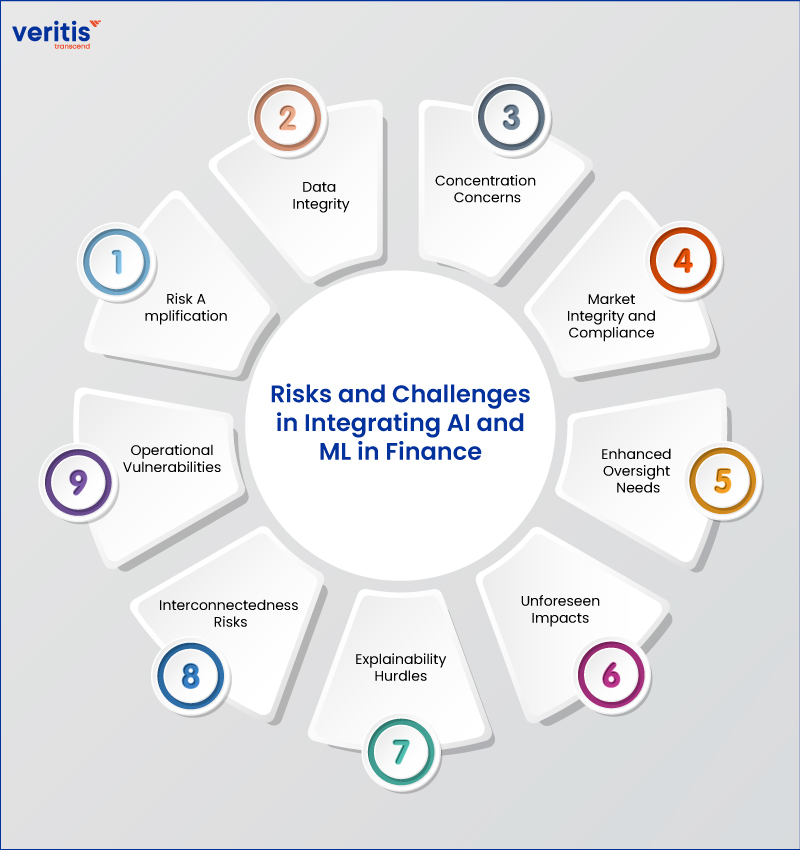 Image source: Veritis
Image source: Veritis
Data Privacy Issues
As AI-driven finance becomes more ubiquitous, concerns surrounding data privacy have intensified. Financial institutions utilize vast amounts of personal data to enhance user experiences and tailor services, raising critical questions about the protection of sensitive information. With the integration of AI systems, there is an increased risk of data breaches and misuse of personal data.
The implementation of robust data protection regulations, such as GDPR in Europe, aims to safeguard user privacy, but compliance remains challenging for many organizations. Ensuring that customer data is handled ethically, stored securely, and used transparently is paramount to maintaining user trust. Organizations must invest in secure systems and engage transparent communication strategies to manage these concerns effectively. For further insights, explore the implications of data privacy in the financial sector on Forbes.
Bias in AI Algorithms
Another significant challenge in AI-driven finance is the presence of bias in AI algorithms. These biases can occur when the datasets used to train AI systems are not diverse or represent fair outcomes. As a result, financial decisions made by AI can inadvertently perpetuate inequalities, leading to unfair treatment of certain demographic groups in areas such as credit scoring, loan approvals, and investment recommendations.
Addressing this concern requires financial institutions to develop and employ ethical AI practices. This includes continuously auditing algorithms for bias and ensuring that training data reflects a broad spectrum of demographic characteristics. By actively working to mitigate bias, organizations can promote fairer financial opportunities for all users. The impact of algorithmic bias in finance is discussed in detail by the Harvard Business Review.
The Need for Human Oversight
Despite the efficiency and analytical capabilities of AI, the need for human oversight remains critical. AI systems, while capable of processing data at incredible speeds, can misinterpret information and make errors, sometimes resulting in significant financial consequences. Human oversight can provide the necessary checks and balances to ensure that AI-generated outcomes align with ethical standards and user needs.
Financial institutions should aim to create hybrid systems where both human expertise and AI capabilities work in tandem. This collaboration ensures that decisions, particularly those affecting customer finances, are vetted through human judgment. Additionally, fostering a culture of accountability can aid in building consumer trust while allowing for the efficient use of AI technologies. For more on the essential role of human oversight in AI, visit McKinsey & Company.
Top AI-Powered Tools for Personal Finance
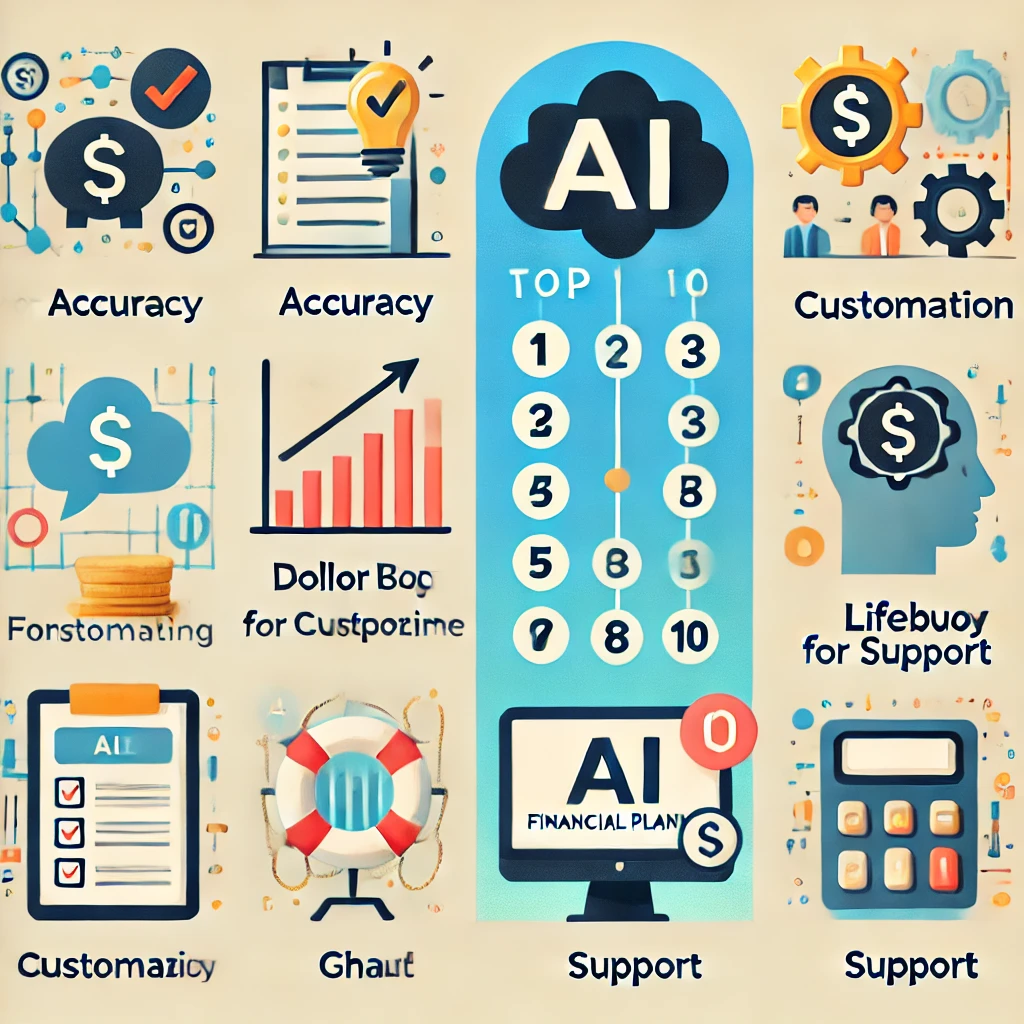 Image source: Redress Compliance
Image source: Redress Compliance
Best Budgeting Apps Using AI
In today’s tech-savvy world, budgeting apps powered by AI have transformed the way individuals manage their finances. These applications utilize machine learning algorithms to analyze spending habits, helping users create a budget that suits their lifestyle. Some top contenders in this space include:
- Mint: This popular app offers a comprehensive overview of finances by tracking income and expenditure, providing an AI-enhanced budgeting experience that personalizes advice and alerts for overspending.
- You Need A Budget (YNAB): YNAB provides real-time analysis and smart notifications, ensuring users stay accountable to their budget goals.
- PocketGuard: Leveraging AI, PocketGuard evaluates income, bills, and expenses to show users how much money they can spend while still meeting their financial obligations.
These budgeting tools not only simplify financial organization but also empower users to make informed decisions about their spending. For more information on budgeting apps, consider exploring resources like NerdWallet.
Most Reliable Robo-Advisors
Robo-advisors have reshaped the investment landscape by offering personalized investment advice at a fraction of the cost of traditional financial advisors. These AI-driven platforms use algorithms to assess risk tolerance, financial goals, and market conditions. Noteworthy robo-advisors include:
- Betterment: Known for its user-friendly interface, Betterment crafts personalized portfolios and automatically rebalances investments based on performance.
- Wealthfront: Wealthfront’s AI algorithms provide tax-loss harvesting capabilities, ensuring users maximize their returns while minimizing tax liabilities.
- Fidelity Go: This service from Fidelity is designed for young investors or those new to investing, offering no minimum balance requirement and low-cost management.
Robo-advisors not only make investment accessible but also adapt to changing market conditions, ensuring your investment strategy remains robust. For a deeper dive into robo-advisions, consider checking Investopedia.
AI-Enabled Fraud Monitoring Apps
With the increasing rate of financial fraud, AI-enabled fraud monitoring apps play a critical role in safeguarding personal finance. These applications utilize advanced algorithms to detect suspicious transactions and alert users in real time. Some top apps include:
- TrueLayer: This app provides secure connections between users and their banks, using AI to detect and alert users to fraudulent activity.
- Expensify: While mainly an expense tracking tool, Expensify includes advanced fraud detection capabilities that help businesses monitor employee expenses.
- Zelle: By analyzing transaction patterns, Zelle’s fraud prevention system alerts users to potentially unauthorized activities.
Utilizing these apps significantly reduces the risk of fraud and enhances the overall security of financial transactions. You can learn more about fraud management strategies at Forbes.
Emerging AI Trends in Financial Management
As the integration of AI in personal finance continues to expand, several emerging trends stand out:
- AI in Wealth Management: Wealth management platforms are beginning to use AI to personalize services for high-net-worth individuals, automating asset management processes to enhance performance.
- Voice-Activated Financial Advisors: The rise of voice technology is leading to AI-driven financial assistants that provide users with on-demand advice through smart speakers.
- Predictive Analytics: Increased use of predictive analytics in financial planning tools helps users anticipate future expenses and savings needs, enhancing the accuracy of financial forecasts.
- Integration with Digital Wallets: The incorporation of AI algorithms into digital wallets enables better transaction monitoring and improves the user experience through tailored offers and incentives.
The ongoing evolution of AI technologies in financial management demonstrates a significant shift toward smarter, more comprehensive financial solutions. For a broader perspective on current trends, see insights on McKinsey.
Conclusion: The Future of AI in Personal Finance
As we look towards the future of AI in personal finance, it’s clear that this technology is set to revolutionize how we manage our finances. From sophisticated automated budgeting systems to nuanced robo-advisors, AI’s role in our financial lives is expanding and becoming increasingly indispensable.
The benefits of AI in personal finance are profound. For individuals, these tools offer personalized insights and tailored advice that were not feasible before. Users can automate tedious tasks, such as expense tracking and budgeting, making it easier to reach their financial goals without the constant need for manual input. Moreover, AI systems are designed to improve fraud detection, ensuring that users feel secure and protected from malicious activities.
However, the emergence of AI-powered financial tools is not without challenges. Data privacy concerns remain paramount, as the sensitive nature of financial information requires robust safeguards. Additionally, the potential for bias in AI algorithms mandates a need for continuous human oversight to ensure fairness and accuracy in financial decision-making.
Looking ahead, the landscape of personal finance will continue to change dramatically. The top AI-powered tools for personal finance are likely to grow in sophistication and reliability, integrating machine learning capabilities that adapt to user behavior over time. For example, budgeting apps will become even more intuitive, while robo-advisors will refine their strategies based on real-world economic changes.
As we embrace the future of AI in personal finance, it is crucial for consumers to stay informed and proactive. By doing so, they can harness the full potential of these technologies to enhance their financial well-being.
For more insights on the impact of AI in finance, please visit Forbes on AI in Personal Finance.
 Image source: Redress Compliance
Image source: Redress Compliance
